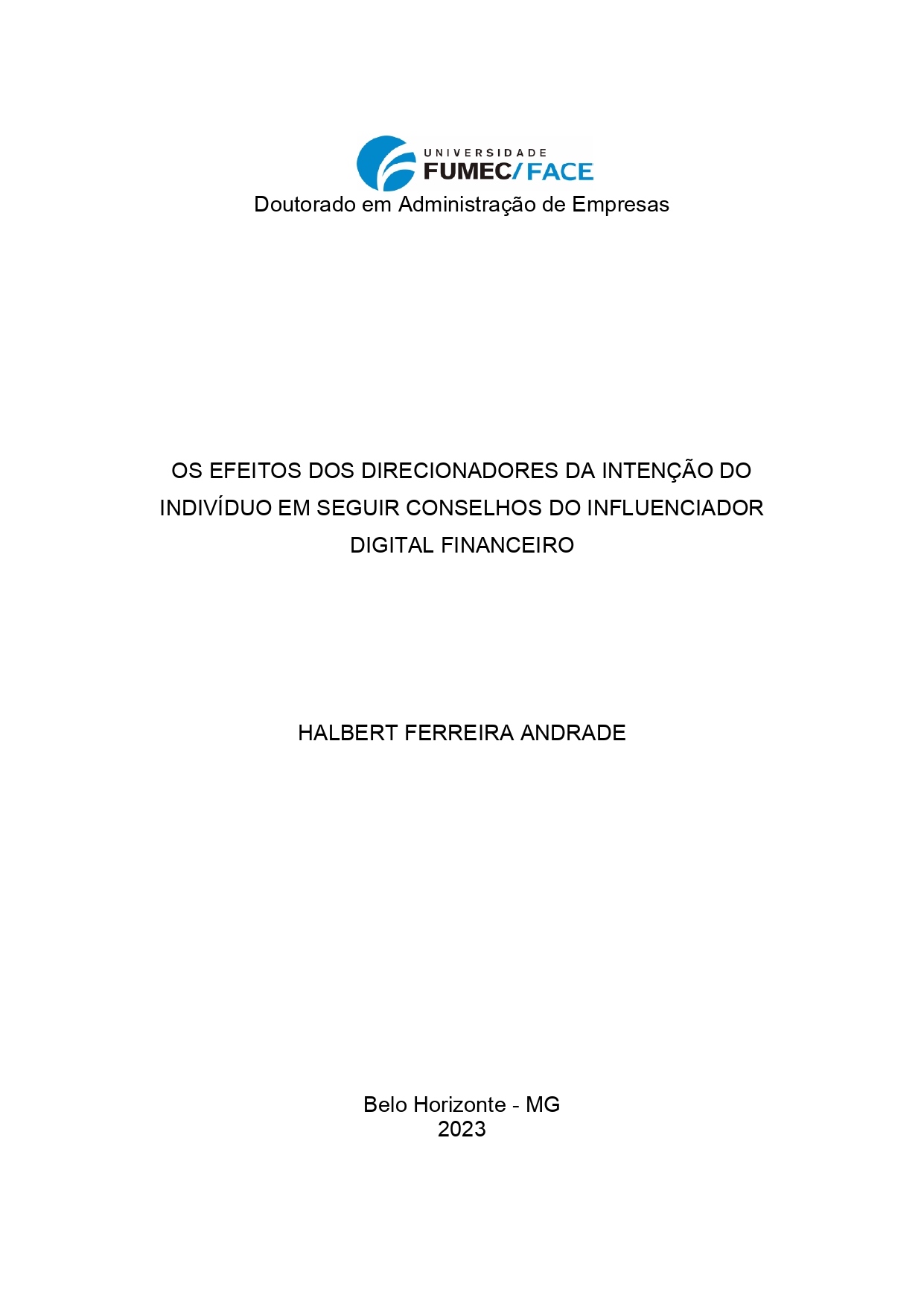Os efeitos dos direcionadores da intenção do indivíduo em seguir conselhos do influenciador digital financeiro

Visualizar/
Data
2023Autor
Andrade, Halbert Ferreira
xmlui.mirage2.itemSummaryView.MetaData
Mostrar registro completoResumo
Essa tese aborda o tema dos influenciadores digitais financeiros e os efeitos que seu trabalho de produção e divulgação de conteúdo financeiro causam no comportamento dos seus seguidores. Este estudo teve por objetivo a análise da influência dos direcionadores da intenção do indivíduo em seguir os conselhos do influenciador digital financeiro. A pesquisa estruturou-se a partir dos conceitos relacionados aos influenciadores digitais financeiros e os efeitos que suas características e conteúdos produzidos geram sobre a intenção comportamental dos seus seguidores. Para que se atingisse o objetivo geral dessa tese, procedeu-se ao desenvolvimento das hipóteses e teste de um modelo conceitual para mensurar a influência dos direcionadores da intenção do indivíduo em seguir os conselhos do influenciador digital financeiro. O modelo considera fatores relacionados aos influenciadores digitais, como atratividade, credibilidade, expertise, confiança, e sua interação parassocial, bem como características da informação e características dos seguidores. O estudo tem abordagem quantitativa e se caracteriza como um estudo descritivo, no qual foi realizado levantamento de campo (survey), com questionário estruturado, fechado. Ao todo, 557 pessoas responderam ao questionário que, após refinamento, resultou em 421 questionários válidos a serem analisados estatisticamente. Os resultados ajudam a entender quais características sociais ou pessoais dos influenciadores digitais atraem mais os seguidores, lançando luz sobre a influência que eles exercem sobre a intenção desses seguidores de seguir os seus conselhos. Embora os resultados mostrem que características pessoais como confiança e expertise são importantes impulsionadores da credibilidade do influenciador digital financeiro, identificou-se que a atratividade não é um fator importante na percepção dos seguidores sobre a credibilidade do influenciador financeiro. Foram apoiadas as relações entre a Necessidade de Informações e a Utilidade, a Qualidade e a Credibilidade das Informações, bem como entre a Credibilidade do Influenciador Digital e da Interação Parassocial com a intenção de seguir conselhos. A relação entre A Utilidade e a Qualidade das Informações e a Capacidade de Decidir foram rejeitadas, assim como a entre a Capacidade de Decidir e a Intenção de Seguir Conselhos. Além disso, as variáveis propensão ao risco, conhecimento financeiro e uso de redes sociais não apresentaram o papel de variáveis moderadoras. Destaca-se que essa tese faz contribuições significativas para o entendimento da influência de influenciadores digitais financeiros nas intenções de seus seguidores. Primeiramente pela abrangente revisão da literatura sobre o tema, seguida pelo desenvolvimento e teste de um modelo conceitual. Esta tese contribui, portanto, estendendo as descobertas anteriores na literatura de influenciadores digitais financeiros. O estudo traz ainda contribuições gerenciais para empresas que podem direcionar seus esforços de marketing de influenciadores e também contribui para que os influenciadores tenham mais conhecimento sobre o trabalho que realizam. Há de se considerar também a contribuição social deste trabalho tendo em vista a relevância do tema de investimentos e educação financeira. This study aimed to develop and test a model to measure the influence of the
drivers of the individual's intention to follow the advice of the financial digital
influencer. The research was structured based on concepts related to financial
digital influencers and the effects that their characteristics and produced content
generate on the behavioral intention of their followers. In order to achieve the
general objective of this thesis, a conceptual model was developed and tested
to measure the influence of the drivers of the individual's intention to follow the
advice of the financial digital influencer. Thus, the hypotheses to be tested in
the research were developed. This study has a quantitative approach and is
characterized as an exploratory study, in which a survey was carried out, with a
structured, closed questionnaire. A total of 557 people answered the
questionnaire, which after refinement resulted in 421 valid questionnaires to be
statistically analyzed. It is noteworthy that this thesis makes significant
contributions to understanding the influence of digital financial influencers on
the intentions of their followers. Firstly, a comprehensive review of the literature
on the subject, followed by the development and testing of a conceptual model.
This thesis therefore contributes by extending previous findings in the financial
digital influencer literature. The results help to understand which social or
personal characteristics of digital influencers most attract followers, clarifying
the influence they exert on the intention of these followers to follow the advice
they give, such as liking, commenting and sharing posts, as well as the intention
to purchase or try products and services. Although the results show that
personal characteristics such as confidence and expertise are important drivers
of the financial digital influencer's credibility, it was identified that attractiveness
is not an important factor in the followers' perception of the financial influencer's
credibility. The influencer's attractiveness does not always affect the perceived
credibility, varying according to the type of product or service and the perception
of risk. The model considers factors related to digital influencers, such as
attractiveness, credibility, expertise, trust, and their parasocial interaction, as
well as information characteristics and followers' characteristics. Based on
statistical evidence, the relationships between the Need for Information and the
Usefulness, Quality and Credibility of Information were supported, as well as
between the Credibility of the Digital Influencer and the Parasocial Interaction
with the intention of following advice. The relationship between the usefulness
and quality of information and the ability to decide were rejected, as well as the
relationship between the ability to decide and the intention to follow advice. In
addition, this thesis investigated possible moderating variables, such as
propensity to risk, financial knowledge and use of social networks, finding that
they do not effectively target the public or the behavior investigated in this
study.
